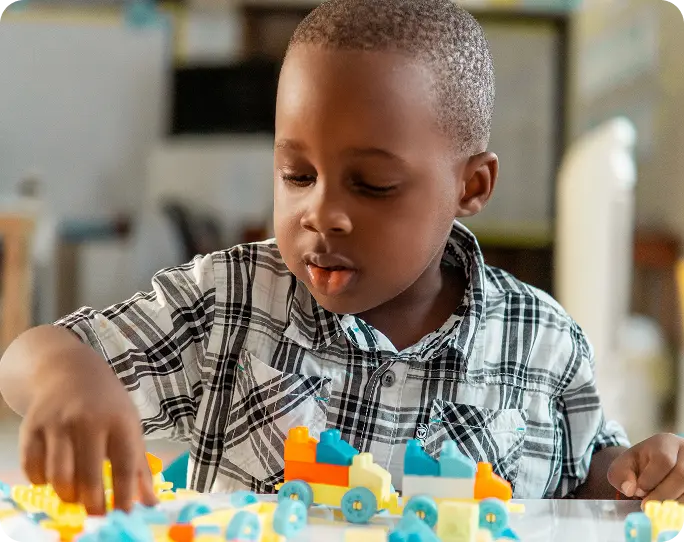WHAT IS AUTISM SPECTRUM DISORDER (ASD)?
Autism Spectrum Disorder (ASD) is a developmental condition that affects how a person
communicates, interacts with others, and experiences the world around them. It is called
a ‘spectrum’ because it affects people in different ways and to varying degrees.
Children with autism may:
- Find it hard to understand social cues or body language
- Prefer routines and struggle with changes
- Show deep interest in specific topics
- Have unusual responses to sensory experiences (e.g., noise, light, touch)
Autism is not an illness and does not have a cure. With the right support, autistic children
can thrive at home, in school, and in their communities.


COMMON SIGNS AND CHARACTERISTICS
Autism is described as a spectrum because every autistic child is different. Some children
may have clear speech but struggle with social understanding, while others may not
speak at all and prefer visual communication. Every child with autism has a unique
combination of strengths and needs.
Communication:
- Delayed speech or not speaking at all
- Repeating words or phrases (echolalia)
- Difficulty starting or holding a conversation
- May not use gestures (like pointing or waving)
Social Interaction:
- Limited or no eye contact
- Prefers to play alone
- Doesn’t respond to name
- Struggles to understand other people’s feelings or social cues
Behaviour and Interests:
- Repetitive movements (e.g., hand-flapping, rocking) – Strong need for routine; upset
- by changes
- Intense focus on specific topics or toys
- Lines things up or plays in unusual ways
Sensory Responses:
- Reacts strongly to certain sounds, textures, lights, or smells – May seem unaware of
- pain or temperature
- Enjoys spinning objects or watching patterns
Note:
Not every child will show all these signs. If you’re concerned, it’s okay to ask for help.
COMMON SIGNS AND CHARACTERISTICS

Children with Autism Spectrum Disorder often learn in different ways. These differences
can be strengths, but they can also create challenges, especially in busy classrooms.
Common learning differences include:
- Needing more time to process instructions
- Difficulty with group tasks or loud environments – Struggling with handwriting or
- fine motor skills
- Needing support to understand abstract ideas
- Finding transitions between activities difficult
Strengths many autistic children may show:
- Excellent memory for facts
- Attention to detail
- Creativity and originality
- Deep knowledge in areas of interest
With the right support and understanding, autistic children can learn and achieve just like
any other child.
SUPPORTING A CHILD WITH ASD
At Home (For Parents)
- Use Visual Routines: Create a picture schedule showing steps for meals, bathing, bedtime, etc.
- Create a Calm Space: A corner with soft items like a pillow or mat can help them feel safe.
- Encourage Interests: Let them explore what they love (e.g., puzzles, animals).
- Use Simple Language: Speak slowly, clearly, and use gestures or pictures.
- Try Visual Timers: Use timers to show how long tasks or breaks last.
- Praise Specific Actions: Celebrate small wins like You put your shoes on – well
- done!
At School (For Teachers)
- Use Visual Aids: Diagrams, pictures, and posters help understanding.
- Seat Them Mindfully: Away from distractions but included in the class.
- Offer Short Breaks: Quiet, sensory-friendly breaks reduce overwhelm.
- Pair with Peer Buddy: Group them with kind, calm classmates.
- Keep Instructions Clear: Use short steps and check for understanding.
- Provide Sensory Tools: Like headphones, fidget toys, or soft materials.

GETTING HELP & WORKING WITH PROFESSIONALS
Autism is not something parents or teachers have to handle alone. There are
professionals who can guide you and your child.
Key people who can help:
Paediatricians: Provide diagnosis and medical advice Speech and Language
Therapists: Help with communication
Educational Psychologists: Assess learning needs and recommend support
Special Needs Teachers or SENCOs: Help adapt the classroom
Social Workers: Support families with accessing services
Important advice:
If you notice any early signs, talk to your child s doctor or teacher. Getting
support early makes a big difference.
WORDS OF ENCOURAGEMENT
Sometimes, just a few kind words can make a huge difference. Whether you’re
a parent or a teacher, remember:
- You are doing better than you think
- Every child is unique and grows at their own pace
- It’s okay to ask for help
- With love, structure, and patience, your child can shine
- You are not alone – there is a whole community here to support you

